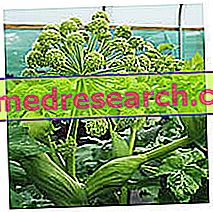See also: menthol in cosmetics - mentillattato in cosmetics
What is Menthol
Menthol is the active ingredient contained in mint essential oil (35-55%); it is a cyclic monoterpene that occurs in white prismatic hexagonal crystals at room temperature. Strongly aromatic and bitter, menthol is particularly known for its local antiseptic, spasmolytic and anesthetic properties.

Properties and Uses
Against cough and bronchitis
The inhalation of the vapors developed by placing a few drops of alcoholic menthol solution in boiling water, are famous for their ability to relieve bronchial disorders and nasal congestions; in fact, menthol has expectorant and disinfectant properties.
An infusion of mint or special syrups can also be used for internal use, such as sedatives for oily cough.
Against the swollen belly
Taken orally, menthol is also used as an antifermentative, carminative (facilitates the elimination of gastro-intestinal gases), antiseptic, cholagogue (facilitates the excretion and outflow of bile), refreshing and spasmolytic (reduces intestinal motility, useful in the presence of colic of the upper gastrointestinal tract, biliary tract and irritation of the colon, such as irritable bowel syndrome).
Local anesthetic
For topical use, thanks to the well-known refreshing and mildly analgesic properties (if applied to the skin it reduces its sensitivity causing cooling), menthol is indicated to relieve itchiness and toothache. At low concentrations it is part of the composition of various ointments, lotions and perfumes, thanks to the characteristic aroma and the pleasant sensation of freshness left on the skin.
Side effects and contraindications
However, the use of concentrated menthol is not free from contraindications and side effects, which include risks of allergic sensitization and contact dermatitis (for external use), gastric and perineal burning, as well as vomiting, nausea and blurred vision for internal use .
Menthol-based preparations to be taken by mouth are contraindicated in cases of biliary obstruction (gallbladder stones), inflammation of the gallbladder, hiatal hernia, gastric and duodenal ulcers, gastroesophageal reflux and in the presence of liver damage. It is very important to respect the recommended intake doses, as menthol has a certain toxicity (the lethal dose in humans is around one gram per kg of body weight).



